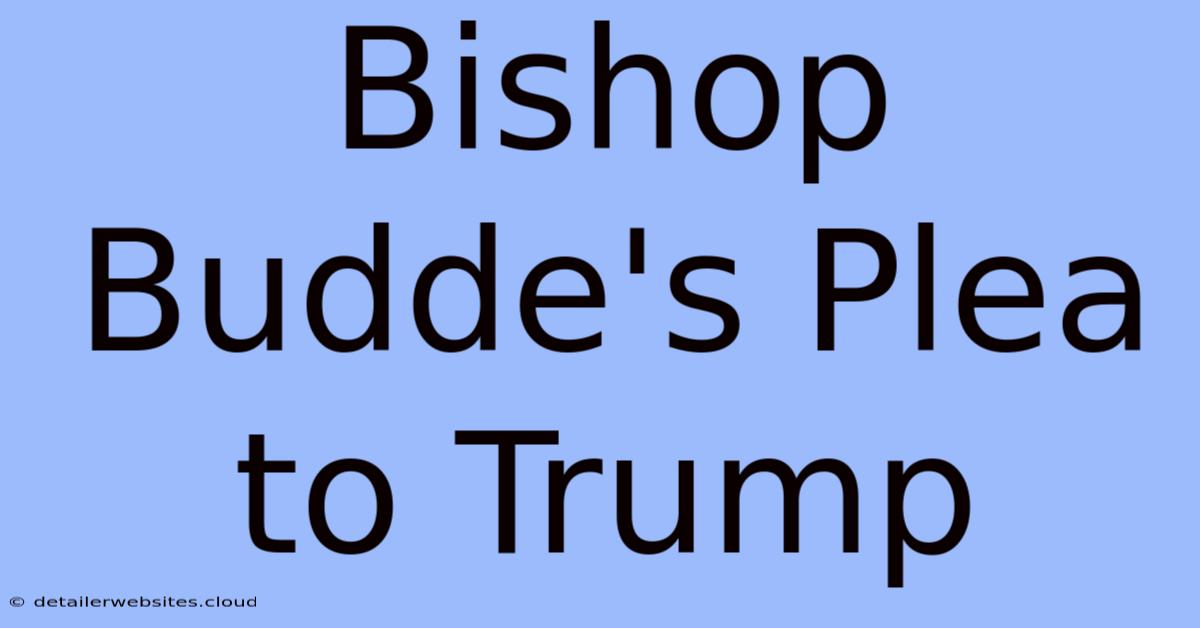Bishop Budde's Plea To Trump

Discover more detailed and exciting information on our website. Click the link below to start your adventure: Visit Best Website nimila.me. Don't miss out!
Table of Contents
Bishop Budde's Plea to Trump: A Call for Moral Leadership in a Divided Nation
Meta Title: Bishop Budde's Plea to Trump: A Moral Call
Meta Description: Explore Bishop Mariann Budde's powerful plea to President Trump, examining its context, impact, and lasting implications on faith, politics, and social justice.
Introduction:
In the turbulent political climate of 2017, a seemingly small act reverberated with unexpected significance. Bishop Mariann Edgar Budde, the Episcopal Bishop of Washington, D.C., penned a deeply personal and impassioned letter to then-President Donald Trump. This wasn't a mere political statement; it was a plea rooted in faith, urging the president to embrace moral leadership and address the escalating social divisions tearing through the nation. This article delves into Bishop Budde's courageous act, examining its context, its impact, and its continuing relevance in today's polarized world. Understanding this moment offers crucial insights into the intersection of faith, politics, and the ongoing struggle for social justice.
The Context of Bishop Budde's Plea:
Bishop Budde's letter arrived amidst a storm of controversy. Trump's presidency had ignited fierce debates on immigration, racial justice, and the role of religion in public life. The "charlottesville" incident, where white supremacists clashed violently with counter-protesters, served as a stark backdrop to the Bishop's concerns. Trump's response to the event – famously stating there were "very fine people on both sides" – deeply troubled many, including Bishop Budde. This statement, perceived by many as condoning hate speech and white supremacy, became the catalyst for her intervention.
The Content of the Letter:
The letter itself wasn't a fiery condemnation but a heartfelt appeal. Bishop Budde, drawing on her deep faith and her role as a spiritual leader, addressed Trump not as an adversary but as a fellow human being, urging him to acknowledge the gravity of the situation and to choose a path of reconciliation and justice. She emphasized the moral responsibility of leadership, reminding him of the biblical call to love one's neighbor and to seek peace. The letter wasn't just about specific policy disagreements; it was a call for a fundamental shift in approach, a plea for a leadership style rooted in empathy and compassion.
(Image Suggestion: A photograph of Bishop Mariann Budde, perhaps with a copy of her letter or a related image symbolizing social justice.)
The Impact and Reception:
The letter's impact was significant, albeit not universally positive. While many praised Bishop Budde's courage and her willingness to engage directly with the President on matters of faith and morality, others criticized her intervention as inappropriate or overly partisan. The letter sparked widespread discussion in both religious and secular circles, highlighting the ongoing tension between faith and politics in contemporary society. The public conversation that followed exposed different perspectives on the role of religious leaders in political discourse and the intersection of faith and social justice.
Analyzing the Lasting Implications:
Bishop Budde's plea continues to resonate because it raises fundamental questions about leadership, morality, and the responsibility of those in positions of power. Her action serves as a powerful example of how faith can be a catalyst for social change and how individuals can find the courage to speak truth to power, even when facing potential criticism. The letter's legacy lies not just in its immediate impact but in its enduring message: true leadership requires more than policy; it demands moral courage, empathy, and a commitment to justice for all.
Beyond the Letter: A Broader Look at Faith and Politics:
Bishop Budde's letter is part of a larger conversation surrounding the intersection of faith and politics. Religious leaders throughout history have played significant roles in social movements, advocating for justice, equality, and human rights. Her action underscores the continuing importance of this intersection, showcasing how faith-based organizations can act as agents of positive change, providing moral guidance and advocating for the marginalized. This engagement, while occasionally fraught with controversy, remains vital to a healthy and just society.
(Infographic Suggestion: An infographic comparing different religious leaders' involvement in political activism throughout history.)
Conclusion:
Bishop Budde's plea to President Trump wasn't just a letter; it was a symbolic act, a powerful testament to the role of faith in shaping political discourse. While the immediate response was mixed, its enduring impact lies in its ability to spark crucial conversations about leadership, morality, and the ongoing struggle for a more just and equitable society. It stands as a reminder that engaging in difficult dialogues, rooted in faith and a commitment to justice, is essential in navigating the complexities of our modern world. What lessons can we learn from Bishop Budde's courageous act, and how can we apply these lessons to our own lives and communities today? What is the role of faith-based leaders in advocating for social justice in a politically charged environment? These questions remain pertinent as we continue to grapple with the challenges of our time.

Thank you for visiting our website wich cover about Bishop Budde's Plea To Trump. We hope the information provided has been useful to you. Feel free to contact us if you have any questions or need further assistance. See you next time and dont miss to bookmark.
Featured Posts
-
Badosa Beats Gauff At 2025 Australian Open
Jan 22, 2025
-
500 B Ai Initiative Trumps Plan
Jan 22, 2025
-
Barcelona Wins 5 4 Over Benfica
Jan 22, 2025
-
Champions League Benfica Vs Barcelona Live
Jan 22, 2025
-
Atletico Madrid Vs Bayer Uefa Live Stream
Jan 22, 2025
